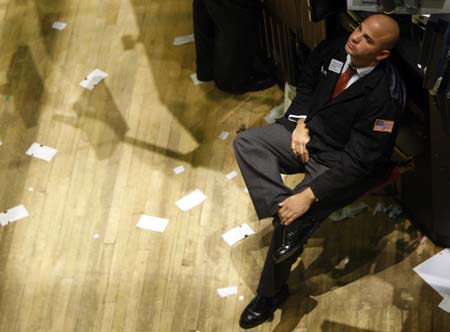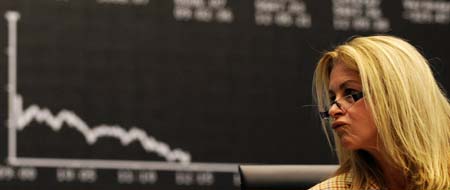The sharp one-day tumbles over the last two Mondays don't come close to the drops that became black marks on the timeline of Wall Street history. Black Monday, in October 1987, and stock drops that preceded the Great Depression were more than 20 percent. Monday's drop, by comparisons, was less than 8 percent at its worst.
For the day, the Dow lost 3.6 percent. The selling was broad: Little more than 200 stocks finished the day higher on the New York Stock Exchange, while about 3,000 finished lower.

A trader works on the floor of the New York Stock Exchange, October 6, 2008. [Agencies]
|
At its lowest point Monday, the Dow was down 800.06, at 9,525.32. The benchmark average dipped below 10,000 for the first time since Oct. 29, 2004, and closed there despite the afternoon rally.
The market's paper loss at the day's lows came to $1.1 trillion, as measured by the Dow Jones Wilshire 5000 Composite Index, which tracks 5,000 US-based companies' stocks. That compares with a loss of about $1.5 trillion last week; that was the worst weekly return since the week after trading resumed following the Sept. 11, 2001, terror attacks.
As an indication of how fearful investors still are, government-backed debt was in high demand. The yield on the three-month Treasury bill, which moves in the opposite direction as its price, fell to 0.49 percent from late Friday at 0.50 percent. Investors are willing to accept low returns to have their money in a secure place.

A trader reacts in front of the German share price index DAX board on the trading floor of the Frankfurt Stock Exchange October 6, 2008. [Agencies] |
Investors also moved into longer-term Treasury bonds as they fled the stock market. The yield on the 10-year note fell to 3.45 percent from 3.60 percent late Friday.
Broader indexes also plunged. The Standard & Poor's 500 index shed 42.34, or 3.85 percent, to 1,056.89; and the Nasdaq composite index fell 84.43, or 4.34 percent, to 1,862.96. The Russell 2000 index of smaller companies dropped 23.49, or 3.79 percent, to 595.91.
Consolidated volume on the NYSE reflected the frantic pace of the day's trading: 7.81 billion shares changed hands, up from Friday's 6.52 billion.
The market "is displaying one of its worst traits with a herd mentality, and investors have an appetite for feeding on fear," said Anthony Sabino, a professor of law and business at St. John's University.
But he cautioned it was still not a nightmare scenario.
"Most certainly, this is not the Great Depression of the 1930s, but (is like) the savings and loan crisis of the 1980s — and we bailed them out," he said. "Once people catch their breath, they'll see this is the proper analogy and this will breathe life back into banking institutions."

